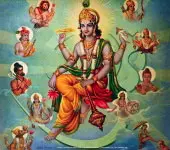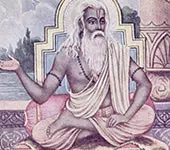न काङ्क्षे विजयं कृष्ण न च राज्यं सुखानि च ।
किं नो राज्येन गोविन्द किं भोगैर्जीवितेन वा ॥ 32.1 ||
na kāṅkṣe vijayaṁ kṛṣṇa na ca rājyaṁ sukhāni ca |
kiṁ no rājyena govinda kiṁ bhogair jīvitena vā ||
Meaning:
I do not desire victory, O Krishna, nor do I want a kingdom or pleasures. Of what use is the kingdom, or enjoyment, or even life itself, O Govinda?
Significance:
- Rejection of Material Gains: Arjuna expresses his lack of desire for victory, kingdom, or material pleasures. This highlights his detachment from worldly gains, which were the primary motivations for most warriors.
- Questioning Life’s Purpose: He questions the purpose of achieving success and comforts if it comes at the cost of significant personal loss and emotional turmoil.
येषामर्थे काङ्क्षितं नो राज्यं भोगाः सुखानि च ।
त इमेऽवस्थिता युद्धे प्राणांस्त्यक्त्वा धनानि च ॥ 33.1 ||
yeṣām arthe kāṅkṣitaṁ no rājyaṁ bhogāḥ sukhāni ca |
ta ime'vasthitā yuddhe prāṇāṁs tyaktvā dhanāni ca ||
Meaning:
Those for whose sake we desire the kingdom, enjoyment, and pleasures are here, standing in battle, having given up their lives and wealth.
Significance:
- Relational Bonds: Arjuna acknowledges that the people for whom he desires these material comforts are the very ones he must fight against. This deepens his inner conflict.
- Cost of War: The verse underlines the paradox of fighting for loved ones, only to destroy them in the process.
आचार्याः पितरः पुत्रास्तथैव च पितामहाः ।
मातुलाः श्वशुराः पौत्राः श्यालाः सम्बन्धिनस्तथा ॥ 34.1 ||
ācāryāḥ pitarāḥ putrās tathaiva ca pitāmahāḥ |
mātulāḥ śvaśurāḥ pautrāḥ śyālāḥ sambandhinas tathā ||
Meaning:
Teachers, fathers, sons, grandfathers, maternal uncles, fathers-in-law, grandsons, brothers-in-law, and other relatives.
Significance:
- Respect for Elders: Arjuna enumerates various relatives present on the battlefield, emphasizing his respect and emotional ties to them.
- Complex Relationships: The verse reflects the complexity of familial relationships and the gravity of the conflict, showing that it’s not just a battle but a civil war within a family.
एतान्न हन्तुमिच्छामि घ्नतोऽपि मधुसूदन ।
अपि त्रैलोक्यराज्यस्य हेतोः किं नु महीकृते ॥ 35.1 ||
etān na hantum icchāmi ghnato'pi madhusūdana |
api trailokya-rājyasya hetoḥ kiṁ nu mahīkṛte ||
Meaning:
Even though they want to kill me, O Madhusudana, I do not wish to kill them, even for the dominion over the three worlds, let alone for this earth.
Significance:
- Rejection of Violence: Arjuna reveals his unwillingness to kill even those who wish to harm him. His refusal stands, even for immense rewards, showing his deep moral values.
- Ethical Stand: This verse shows his commitment to non-violence and righteousness, even in the face of personal risk.
निहत्य धार्तराष्ट्रान्नः का प्रीतिः स्याज्जनार्दन ।
पापमेवाश्रयेदस्मान्हत्वैतानाततायिनः ॥ 36.1 ||
nihatya dhārtarāṣṭrān naḥ kā prītiḥ syāj janārdana |
pāpam evāśrayed asmān hatvaitān ātatāyinaḥ ||
Meaning:
O Janardana, how can we be happy by killing the sons of Dhritarashtra? We will only incur sin by killing these aggressors.
Significance:
- Questioning Moral Consequences: Arjuna questions how any joy or satisfaction can come from killing his own kin, emphasizing the moral dilemma of whether victory is worth the sin involved.
- Sin and Morality: The verse highlights the moral consequences of actions, suggesting that material gains do not justify unethical actions.
तस्मान्नार्हा वयं हन्तुं धार्तराष्ट्रान्स्वबान्धवान् ।
स्वजनं हि कथं हत्वा सुखिनः स्याम माधव ॥ 37.1 ||
tasmān nārhā vayaṁ hantuṁ dhārtarāṣṭrān svabāndhavān |
svajanaṁ hi kathaṁ hatvā sukhinaḥ syāma mādhava ||
Meaning:
Therefore, we should not kill the sons of Dhritarashtra, our own relatives. How can we be happy, O Madhava, by killing our own people?
Significance:
- Decision Against Battle: Arjuna concludes that killing his relatives is not justified. This reveals his deep internal struggle with the decision to engage in battle.
- Human Values: The verse underscores the importance of compassion, family ties, and the pursuit of happiness without harm to others.
Today's Context
These verses reflect Arjuna's inner conflict and reluctance to fight against his own relatives, highlighting the moral and ethical dilemmas he faces on the battlefield of Kurukshetra.
- Moral and Ethical Dilemmas:
These verses illustrate Arjuna's profound moral and ethical conflict as he faces the prospect of fighting his own relatives in battle. This resonates with modern challenges where individuals frequently encounter situations demanding difficult ethical decisions. Whether in business, politics, or personal life, people must often choose between conflicting values, such as profit vs. ethics or duty vs. compassion. - Personal vs. Professional Conflicts:
Arjuna’s reluctance to engage in battle, despite it being his duty, mirrors the struggle many face in balancing personal relationships with professional responsibilities. In today’s workplace, people often have to make tough choices that can affect their colleagues, friends, or family, testing their ability to manage personal relationships without compromising professional duties. - Pursuit of Material Success:
Arjuna’s questioning of the value of victory, kingdom, and pleasures invites reflection on the pursuit of material success. In contemporary society, where the quest for wealth, power, and status is prevalent, these verses challenge individuals to consider whether such achievements truly bring fulfillment or whether they come at too great a personal or ethical cost. - Empathy and Compassion:
Arjuna’s hesitation to harm his kin emphasizes the importance of empathy and compassion, even towards adversaries. This has significant implications for modern conflicts, whether they are interpersonal disputes, corporate competition, or international relations. It underscores the value of considering the broader human impact of our actions and decisions. - Inner Peace vs. External Rewards:
Arjuna's internal conflict highlights the tension between inner peace and external rewards. Many people today find themselves stressed and dissatisfied despite achieving outward success. These verses encourage introspection about what truly brings happiness and peace, suggesting that inner harmony and ethical living may be more valuable than external achievements. - Consequences of Actions:
Arjuna's concern about the consequences of killing his relatives, even if they are aggressors, reflects the broader principle of considering the repercussions of one's actions. This principle is vital in modern contexts where actions, particularly those involving power and authority, can have far-reaching impacts on society and the environment. - Duty and Responsibility:
Finally, these verses challenge the reader to think deeply about the nature of duty and responsibility. They highlight the complexity of performing one’s duty when it conflicts with personal values and relationships, a dilemma that is still relevant for leaders, professionals, and individuals navigating their roles in society today.
Aditi Sharma is a young entrepreneur who has built a successful tech startup. Her company, EcoTech, specializes in creating sustainable technology solutions to reduce environmental impact. She employs a small but dedicated team and has recently been approached by a major corporation, MegaCorp, which offers a lucrative acquisition deal.
This deal promises significant financial rewards but requires EcoTech to shift focus to more commercially driven projects that might compromise their core values of sustainability and ethical practices.
Aditi is excited about the potential growth and the financial security the deal with MegaCorp could provide. However, the terms of the acquisition require her to lay off several employees and pivot the company's mission towards projects that are not aligned with her commitment to sustainability.
The acquisition requires Aditi to make a decision that affects her team—her extended family at work. She knows that accepting the deal will benefit her financially but will betray the trust and commitment of her employees, some of whom have been with her from the beginning and share her vision for sustainable innovation.
The lucrative offer from MegaCorp is tempting. It promises a substantial payout and the prestige of being part of a larger organization. However, it comes at the cost of compromising EcoTech's mission and values.
Aditi feels a strong sense of responsibility towards her employees, who have shown dedication and shared her passion for sustainable technology. She empathizes with their potential plight if the acquisition leads to job losses and a shift away from their shared values.
Aditi contemplates whether the financial benefits and external recognition from the acquisition will bring her true satisfaction. She realizes that her inner peace stems from her commitment to sustainability and the well-being of her team, not merely from financial gain.
Aditi foresees the potential negative impact of her decision on her team and the company's mission. Accepting the deal might lead to environmental compromises and loss of trust among her employees and customers.
Aditi recognizes her duty towards her company’s mission of sustainability and her responsibility towards her employees. She decides that her duty as a leader is to uphold the ethical standards she has set and to protect the interests of her team.
Comments
Read more comments
Knowledge Bank
Who guards amrita in Swarga Loka?
As soon as amrita was obtained, Devas gave it to Lord Nara for safe custody. In Swarga Loka. Devas take turns to guard amrita. When Garuda attacked, it was Vishwakarma who was protecting amrita. The pot of amrita is kept in the middle of a rotating wheel with sharp teeth and is protected by two fierce serpents.
Which among the Dasha Mahavidyas is connected with Brahmastra?
There are several mantras of Devi Bagalamukhi which can be used as Brahmastra.
Quiz
Recommended for you
Asana and Pranayama as per Ashtanga Yoga explained

Long life is irrelevant

Vighnaraja Stuti

stotraraajamenasopamuktashuddhachetasah'. eepsitaarthamri'ddhisiddhimantrasiddhabhaashitaah' praapnuvanti te ganeshapaadapadmabhaavitaah'.....
Click here to know more..